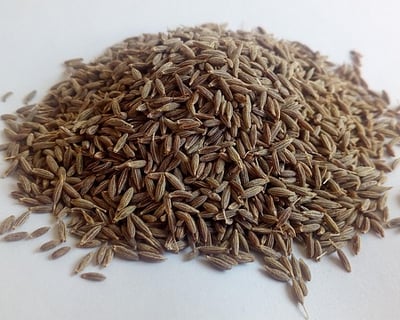Cumin, known as "Jeera" in India, is a small seed with a colossal impact on global cuisine. Originating in the Mediterranean, it has found a home in kitchens worldwide, but perhaps nowhere is its presence more profound than in India. This unassuming spice, whether whole or ground, lays the aromatic foundation for countless dishes, from comforting dals and vibrant curries to refreshing beverages.
Its warm, earthy, and slightly pungent flavor is released when toasted or tempered in hot oil, creating a distinctive fragrance that defines Indian cooking. Beyond its culinary charm, cumin holds a cherished place in traditional medicine, particularly Ayurveda, valued for its digestive benefits and rich antioxidant content. From ancient traditions to modern kitchens, cumin's journey highlights its remarkable versatility and enduring role as a fundamental spice.
Cumin is known by various names, reflecting its widespread cultural integration:
Hindi: जीरा (Jeera)
Malayalam: ജീരകം (Jeerakam)
Marathi: जिरे (Jire)
Kannada: ಜೀರಿಗೆ (Jeerige)
Spanish: Comino (koh-MEE-noh)
French: Cumin (koo-MAN)
German: Kreuzkümmel (KROYZ-kue-mel) - Note: Kümmel alone usually refers to caraway.
Italian: Cumino (koo-MEE-noh)
Chinese (Mandarin): 孜然 (zī rán) (tsee-RAN)
Japanese: クミン (kumin) (koo-meen) - This is a direct transliteration of the English word.
Arabic: كَمُّون (kammūn) (kam-MOON)
Here are some of the key health benefits of cardamom:
Promotes Digestion: Cumin is perhaps best known for its digestive properties. It contains compounds that can stimulate the activity of digestive enzymes, which helps in the efficient breakdown of food. It also aids in increasing the release of bile from the liver, crucial for fat digestion.
Rich in Antioxidants: Cumin is packed with beneficial plant compounds, including terpenes, phenols, flavonoids, and alkaloids, many of which act as powerful antioxidants. Antioxidants help to neutralize free radicals, which are unstable molecules that can cause cellular damage.
Anti-inflammatory Properties: Cumin possesses anti-inflammatory effects. The active ingredients, such as cuminaldehyde and thymoquinone, can help reduce inflammation in the body. Chronic inflammation is a root cause of many health problems, so this property of cumin is highly beneficial.
Good Source of Iron: Cumin seeds are naturally rich in iron, a vital mineral essential for the production of hemoglobin, which carries oxygen in the blood. A single teaspoon of ground cumin can provide a significant portion of the daily recommended iron intake, making it beneficial for preventing and managing iron deficiency anemia.
Grades based on the demanding standards of key international markets:
European Quality / Europe 99.5% / CRE 101: Generally represents the highest purity (99.5% or even 99.8%) with stringent limits on all contaminants, often sortex cleaned. Required by EU countries.
USA Supreme Quality / USA 99.5%: Similar to European quality, adhering to US FDA standards.
Gulf Quality / Gulf 99% / CRE 104: High purity (typically 99% or 98%), machine cleaned, meeting the standards of Middle Eastern markets.
Singapore Quality / Singapore 99% / CRE 106: A popular quality, often 99% purity, balancing price and quality for a wide range of Asian and African markets.
Premium Grade: A general term for very high purity (99.5% or above) and superior quality in all parameters.
Regular Grade: Moderate purity (98%) with good flavor.


Cumin
Medical Disclaimer
This information is for general knowledge only and isn't medical advice. It's not a substitute for professional medical consultation. Always consult your doctor or another qualified healthcare provider with any health concerns or before starting any new treatment.
Services
Exporting quality Indian spices, oils and trade services.
© 2025. All rights reserved.
contactusgtsi@gmail.com
Coming Soon
GST NO: 27abcfg5560a1ZR IEC : abcfg5560a
